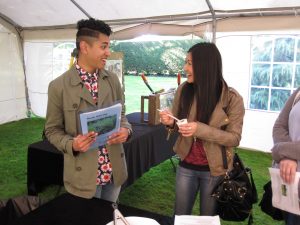Autumn is the time when gardeners are planning the next year’s planting. The Really Wild Veg project will hopefully run again in 2015 and some initial research has identified wild celery, Apium graveolens, and wild turnip, Brassica rapa subspecies campestris as new crop wild relatives to trial. More details to follow…
The main purpose of this post is to provide an update on the trials at Cruickshank Botanic Garden. As these trials were sown later than other plots they have yet to be harvested and assessed for productivity, pest/disease and taste. Below Josh has provided a final update on how the Aberdeen trials have been going:
Despite the late start all the varieties of brassicas and carrots are now doing exceptionally well. There seems to have been a final growth spurt since the public engagement event at the Garden on the 11th September. I aim to harvest my crops between the 27th and 30th of October. The darker evenings are creeping in and there seems to be a light frost some mornings too. This summer has been enjoyable though; I have faced some challenges and learnt a lot from growing the brassicas and carrots and hopefully I will get the chance to do this again.
Josh has also been looking at the use of blogs in botanic gardens as a way of providing regular updates on activities to project partners and other interested individuals.
This area of research became an area of personal interest with the sending of regular updates for the Edible Gardening Project blog to Max over the summer. What I have come to recognise so far is that blogging has become the most popular activity online among those that use social media. Considering the fact that blogs have been around for nearly half the time since the inception of the World Wide Web, within a botanic garden context they have only recently hit the limelight and are being incorporated into the learning environments. In botanic gardens blogs seem to be predominately used to offer advice to plant enthusiasts, tips on seasonal crops or provide update on research projects. A great strength of blogging is that it empowers bloggers. They have control over their written material and can express their views freely. Blogs also facilitate the sharing of knowledge, improving critical thinking and provide added food for thought on subjects of interest to the reader.
The Botanics Stories blog as a whole recieves around 2,000 unique visits per month and this method of communication is still realtively new to the Botanics so I would be interested to hear if the Really Wild Veg blog has been a good way to keep participants updated on project developments.


2 Comments
2 Pingbacks